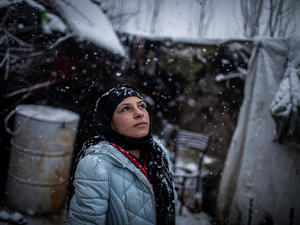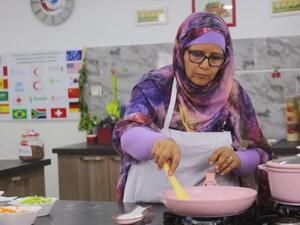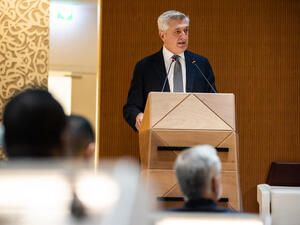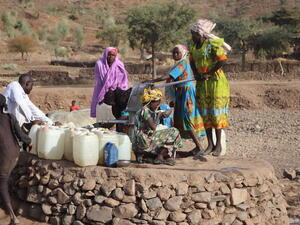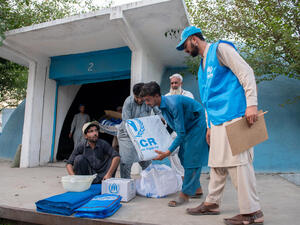UNHCR steps up emergency assistance in Libya as continued conflict and COVID-19 create more hardship
UNHCR steps up emergency assistance in Libya as continued conflict and COVID-19 create more hardship

UNHCR distributes emergency aid in Tripoli to assist vulnerable people during Ramadan, and as war and COVID-19 present new threats.
Amidst deteriorating security conditions, as well as restrictions on movement due to COVID-19, UNHCR, the UN Refugee Agency, has provided emergency assistance to some 3,500 refugees and internally displaced Libyans during the last two weeks. The assistance package helped some 1,600 urban refugees, more than 700 refugees being held in detention and close to 1,500 displaced Libyans in different sites across Libya, and included one month’s worth of food and hygiene kits.
The distributions are supporting some of the most vulnerable people with help during Ramadan – an important moment to show solidarity as people are struggling with their daily needs. They have been organized in coordination with local authorities and partners, LibAid and the International Rescue Committee, and other UN agencies.
Refugees told UNHCR staff that they were desperate for help. Many had been supporting themselves through daily labour, which has had to stop because of the curfew and other restrictions related to the outbreak of the COVID-19 pandemic. A snapshot survey by the Mixed Migration Centre suggests some 75 per cent of refugees and migrants lost their jobs in March and April. Before Ramadan, some said they could only afford to eat one meal per day. Others formerly received extra assistance from relatives through international money transfers but were now struggling as this had stopped in recent weeks. Some are facing eviction threats from their landlords as they have fallen behind with rental payments.
Food prices spiked in most cities in Libya soon after COVID-19 measures were implemented, for example, the average cost of tomatoes has gone up by more than 200 per cent in some places, while the cost of peppers has increased by around 40 per cent.
Shortages of basic items, such as eggs, vegetables and wheat, are being reported in cities across Libya, as the country struggles to import produce in the face of global supply chain breakages and conflict in the western part of the country blocks supply routes.
Prices for hygiene items have gone up by at least 60 per cent, with prices for gloves and masks having more than tripled.
Meanwhile, UNHCR is continuing to provide support to the Libyan authorities and displaced Libyans during the COVID-19 pandemic.
The ongoing conflict and continued shelling, despite calls for a humanitarian pause, has severely impacted the country’s fragile health system and medical services, which have limited resources and face shortages of basic equipment and medicines.
Many hospitals or health facilities, located in areas close to the conflict, have also been damaged or closed. UNHCR and partners continue to conduct public health awareness campaigns amongst refugees, asylum seekers, through posters, text messages and social media, aimed at mitigating the risks of exposure to COVID-19.
UNHCR and partners have also provided generators, ambulances, prefab-containers and tented clinics in support of local healthcare services across the country. Core relief items, including mattresses, blankets, kitchen sets, jerry cans, tarpaulin, clothes and solar lamps, have been distributed to the health authorities in Misrata. Soap has been distributed in settlements for some 20,000 internally displaced people in Benghazi, as well as in several detention centres in the eastern part of the country where hygiene conditions are very poor. Hygiene kits have been distributed to several hundred displaced Libyan families in Ain Zara, western Libya.
UNHCR echoes the appeal of the UN Secretary-General António Guterres urging warring parties across the world to cease their fighting in support of the response to the threat of the COVID-19 pandemic. UNHCR also calls on the international community to come forward with further funding to meet the rising humanitarian needs as result of COVID-19. As part of the wider UN appeal, UNHCR called on States last week to provide some US$745 million to assist forcibly displaced populations around the world impacted by the pandemic.
For more information on this topic, please contact:
- In Tripoli, Caroline Gluck, [email protected], +218 91 000 7195
- In Tunis, Tarik Argaz, [email protected], +216 299 612 95
- In Geneva, Charlie Yaxley, [email protected],+41 795 808 702
- In New York, Kathryn Mahoney, [email protected], +1 347 443 7646

